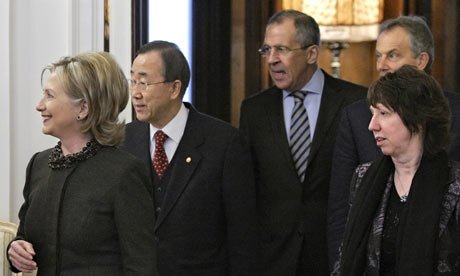
Middle East quartet members Hillary Clinton, Ban Ki-moon, Sergey Lavrov, Tony Blair and Lady Ashton at talks in Moscow. Photograph: Alexander Zemlianichenko/AP
The US and Israel may have defused their immediate row over housing in East Jerusalem but the obstacles to successful Israeli-Palestinian peace negotiations remain as substantial as ever.
Even if US-brokered "proximity talks" get under way, hopes are not high that the gaps between the two sides on key issues can be easily bridged. George Mitchell may be an experienced diplomat, but he cannot walk on water.
The Ramat Shlomo spat has been a sudden reminder of the huge sensitivity of the Jerusalem issue. Mahmoud Abbas, the Palestinian president, insists on starting out from the land swap offer made to him by Ehud Olmert last year. Binyamin Netanyahu rejects that. Borders, refugees and settlements also remain to be tackled at a time when neither side appears to have the will or the domestic support needed for the concessions required to reach a deal.
"We have a lack of interest on the Israeli side and a lack of strength or ability to go forward on the Palestinian side," said Michelle Dunne of the Carnegie Endowment for International Peace in Washington. "That's not very promising."
The response of Avigdor Lieberman, Netanyahu's hawkish foreign minister, was that "peace will be established through actions and not by force". Palestinians, he said, need to prove they really want negotiations. Abbas was already lukewarm about a resumption: the US-Israeli kiss and make-up is unlikely to make him more enthusiastic. And Hamas, the Islamist movement that controls Gaza and rejects talks with Israel, urged Abbas to allow "the resistance" to fight Israeli designs on Jerusalem. This all suggests that US calls for mutual "confidence-building" will be hard to translate into concrete steps.
The quartet statement from Moscow repeated support for the August 2009 plan to build a Palestinian state within 24 months: that was a none-too-subtle hint to Israel that, more than four decades since the 1967 war, talks cannot be open-ended and that the failure of bilateral negotiations could mean the unilateral establishment of a Palestinian state and recognition by the rest of the world.
Gaza remained the subject of "deep concern", with a warning about the continuing deterioration in the humanitarian situation of 1.5 million civilians more than a year after the war. The quartet talked of promoting Palestinian unity and the reunification of the West Bank and Gaza. But it conspicuously failed to mention Hamas, which does not seem to be part of anyone's strategy.
















































No comments:
Post a Comment